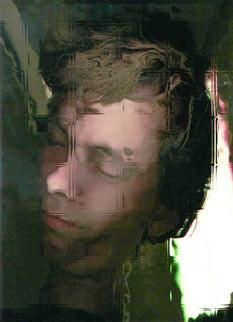| |
S: I’m speaking to Brian Hagemann, who is the Director of Unknown Covert Network Operations here in the Control Center. There’s, ah, I can count six computer screens without turning my head. Actually, we’re hiding The Unknown presently, on a Peace-Ed server. But I think that’s appropriate, since so much of The Unknown is about peace, and about education.
B: It is?
S: And you actually have a degree in peace, don’t you?
B: A degree in Education, and a certificate in Peace Studies.

S: So, that was pretty much our main concern with a technologist, was that he be concerned with peace, which is one of the major factors involved in The Unknown.
B: See, I didn’t realize that.
S: Ah, at first it was all about decadence, but we’re past that now, man.
B: Well, people go through that phase.
S: We’re—I’m not quite sure if we have like a fall, or if we started out fallen and had a rise. I don’t know—what do you figure?
D: It seems pretty clear to me that we started out in the depths of degradation, sank lower, and then eventually have made a gradual upturn.
S: So now, we’re trying to write good Unknown stuff.
D: Right.
B: What were you trying to do before?
S: Well, we were, I mean, we’re not talking about the quality of the writing, as much as the quality of the characters, ah, who are involved, who are us.
D: Pretty much the first few chapters of The Unknown paint us as self-involved, arrogant assholes, doing what we can to upset people, and being as rude as possible.
B: And you’re saying that was not your intent?
S: I think that was our intent.
D: That was our intent at the beginning, oh yeah, definitely.
S: But now it’s gotten so… sick and decadent. We’re trying to bring a social consciousness to the whole piece as well. That’s why we’re going to go around the country, planting grass with MacArthur Fellows.
B: MacArthur Fellows? What’s that?
S: They’re these big fellowships. Genius grants. Which—in The Unknown, we go to apply for one, then they take one look at us and decide that we aren’t geniuses. But they do give us the addresses of the people who’ve received these grants, so we go around the country, ah—
B: Asking ‘em for money?
S: Well, crashing at their places, usually. Sometimes planting grass with them.
B: Well, it doesn’t take a genius to know to plant grass.
S: Yeah, it doesn’t, but, ah, there’s money there.
B: Uh huh. See this as a future for yourself, planting grass?
S: Well, I think when we actually do the actual book tour, we’re going to try to work out some grass planting along the way, too.
B: So—The Unknown—is it about the book before the book comes out, or is it the book?
S: It’s about the book… tour.
B: Which hasn’t happened.
S: Which hasn’t happened yet.
B: Because there’s no book yet.
S: Well, there is no book yet, that’s true. There is—
B: That could present a problem for your tour. Where are you gonna sign?
S: See, we do have all the book written, though. We have the book written, we just don’t have it—
B: So, you could show it to people, and then sign their autograph.
S: On the actual, actual tour, we will actually have books with us.
B: Oh, okay.
S: On the tour that we describe in the hypertext, of course, we were fictional characters, rather than ourselves. Although at points, we are ourselves. We keep popping out of being our characters and—
B: Does that present a problem for you, in the real world?
S: Uh, yeah. Who am I?
B: Yeah.
S: I’m constantly asking myself that. Who am I? Who are these people that I know? I always forget people’s names. Sometimes I forget my name.
|

In the Bunker
4:29
512K
|


